Unlocking Global Trade Efficiency
Promoting Digital Trade through the Adoption of the UNCITRAL Model Law on Electronic Transferable Records (ICC)
The session delved into the multifaceted landscape of digital transformation within global trade, unravelling key initiatives and discussions shaping this dynamic evolution.
The European Bank for Reconstruction and Development (EBRD) took centre stage, articulating its steadfast commitment to championing the Malitra reform over the past year. The reform, strategically designed to enhance financial access for small and medium-sized enterprises (SMEs) in the digital era, echoed the EBRD’s proactive involvement in evaluating countries’ digital readiness and advocating for essential legal reforms conducive to digital trade.
The discourse seamlessly transitioned into the realm of Electronic Bills of Lading (EBLs), where the session unveiled compelling arguments and challenges. The imperative for legal recognition, the gradual legislative pace, and the intrinsic benefits of EBLs, such as accelerated processing and risk mitigation, were eloquently explored. The introduction of the Melita digital platform emerged as a game-changer, providing a comprehensive solution with its legal framework and heightened control mechanisms over trade documents, potentially revolutionising the landscape of electronic transferable documents.
The International Chamber of Commerce (ICC) Digital Standards Initiative took the narrative forward, emphasising a collaborative paradigm essential for propelling digital trade into the mainstream. The initiative, headquartered in Singapore, underscored the urgency to modernise logistical processes and global cross-border trade. The instrumental roles played by the banking industry and trade finance were spotlighted, accentuating the manifold benefits of digitisation, including cost efficiency, risk reduction, and expeditious operations.
The spotlight then shifted to UNCITRAL’s Model Law on Electronic Transferable Records (MELITRA), a beacon of innovation in the digital transformation journey. MELITRA’s universal acceptance, particularly within G7 countries, was lauded, accompanied by tangible benefits such as substantial cost savings for businesses. The session celebrated the growing acceptance of electronic bills of lading, indicative of a robust momentum propelling the digitisation of global trade.
In conclusion, the session underscored the swift pace of digital transformation in global trade, driven by pivotal initiatives like MELITRA and the ICC Digital Standards Initiative. The recognised benefits of this digitisation, ranging from heightened efficiency to substantial cost savings, were woven into the session’s narrative. The call to action resonated strongly — businesses were urged to proactively embrace these transformative changes to remain competitive in the ever-evolving global market. The digital future of global trade promises not only growth and collaboration but also heightened operational efficiency in a landscape marked by constant change.
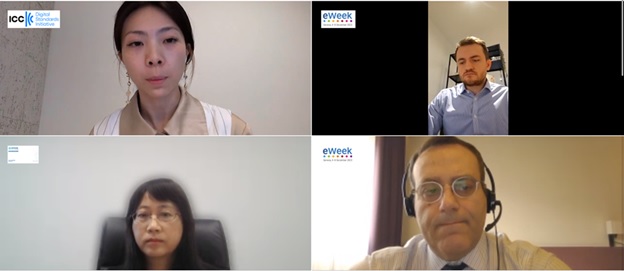
On the panel were: Jun Xu, Vice Chair of ICC Banking Commission, International Chamber of Commerce (ICC); Luca Castellani, Legal Officer, United Nations Commission on International Trade Law; Milot Ahma, Legal Counsel, European Bank for Reconstruction and Development; and Tianmi Stilphen, Lead Legal Reform/Regulatory Affairs, International Chamber of Commerce Digital Standards Initiative
(Reporting by Sovini Mondal)
Making the Case for Digital Connectivity for MSMEs
How Improved Take-Up and Usage of Digital Connectivity, in Particular for E-commerce, Supports Development Projects
This session, organised by eTrade for all, ITC, Broadband Commission (ITU) and GSMA, is rooted in exploring the recent ITU Working Group on Connectivity for MSMEs report. The Working Group explores the gaps in connectivity and digital tools usage by entrepreneurs and small businesses. It finds that greater work is needed from governments and the private sector to bolster inclusivity in online trade.
In the introductory presentation, the Group showed the data gaps in MSMEs and emphasised that connectivity for MSMEs is a journey, not a destination. This means that there is a need to focus on the individual, and then create a basis for MSME connectivity before exploring a wider audience. Such investments in connectivity can deliver opportunities to both increase revenues and reduce costs.
The Group outlined several barriers to MSME uptake: access, affordability, awareness of relevance, knowledge and skills, and safety and skills. Moving forward, the paper recommends that governments play a leading role in tackling these issues, and encourage International Organisations (IOs) to help them. They also mention the need to recognise the gender divide within the issue of connectivity and suggest a concerted effort to overcome this.
The panel featured members of the private sector as well, and the panellists recognised the importance of encouraging greater public-private partnerships. The most important thing in the mind of the public sector is creating trust, and hence reinforcing online security.
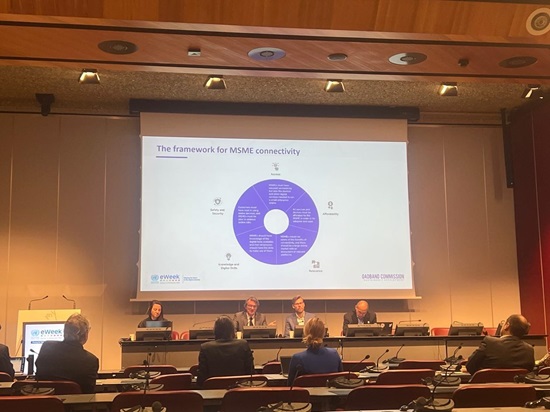
On the panel were: Melle Tiel Groenestege, Senior Director, Digital Inclusion at GSMA; Quaye Thelma Efua, Director, Digital Infrastructure, Skills and Empowerment at Smart Africa Secretariat; Alex Wong, Senior Advisor, Strategic Engagement and Initiatives at ITU; James Howe, Senior Adviser at International Trade Centre; and Cynthia Saab, Global Vice President, Digital Country Partnerships at Mastercard.
(Reporting by Ally Tutay)
Digital Economy and Environmental Sustainability
The session at the UNCTAD E-Commerce Week, 2023 dwelled upon the transformative role of digital technologies in addressing ecological planning and climate challenges. While highlighting their positive impact, the discourse critically examined the environmental footprint of digital tools and tech giants’ role in overconsumption. Concerns about AI priorities and the call for ethical use were put forth, emphasising the necessity for behavioural changes, regulations, and global cooperation to ensure sustainable digital practices.
The session gave insights into the use of digital technologies and data to bridge the implementation gap in ecological planning and transition. These technologies play a crucial role in combating climate change and biodiversity loss as put forth in the panel. By incorporating digital technologies into energy management systems, it becomes possible to optimise resource use, reduce CO2 emissions, and improve overall operational efficiency.
However, the discussion was not uncritical of the significant negative environmental impact of digital tools. The manufacturing process of devices like smartphones and laptops contributes to CO2 emissions and generates toxic waste and excessive water usage. The role of digital platforms like Amazon, Apple, Google, and Facebook in promoting overconsumption was highlighted.
The panel raised concerns about the role of Artificial Intelligence (AI) in contributing to environmental issues. While AI has the potential to aid in environmental preservation, the current focus of AI systems on advertising purposes rather than environmental considerations is problematic. Privacy concerns, issues related to AI, and the digital divide need to be addressed to ensure the responsible and ethical use of digital technologies.
On a positive note, the panellists emphasised the importance of wisdom and behavioural changes as solutions to the climate crisis. This includes adopting sustainable practices such as increasing walking and cycling and reducing overall consumption, highlighting the need for purposeful and efficient use of data, rather than its indiscriminate accumulation.
The discussion underscored the importance of holding big tech companies accountable and implementing regulations. It is necessary to rein in their activities to ensure more sustainable practices. A data tax was also suggested as a means to incentivise responsible and efficient data use. Additionally, public platforms can support the private sector’s transition to greener practices.
Moreover, panellists emphasised the need for international standards and cooperation. Incorporating environmental goals into trade agreements and digital ecosystems was advocated to be crucial for ensuring responsible consumption and production patterns. They also highlighted the outsourcing of environmental damage to poorer countries. The session called upon multiple stakeholders to collaborate and work together in tackling the challenges associated with digitalisation. By fostering global partnerships and leveraging collective expertise, these stakeholders can effectively address the multifaceted aspects of digital transformation, including environmental concerns.
In conclusion, the session illuminated the dual nature of digital technologies in ecological planning, acknowledging their potential for positive transformation while critiquing their environmental drawbacks. The call for ethical AI use, regulatory measures, and global collaboration underscored the imperative to navigate the complexities of digitalisation, fostering sustainability and responsible practices in the pursuit of environmental goals.
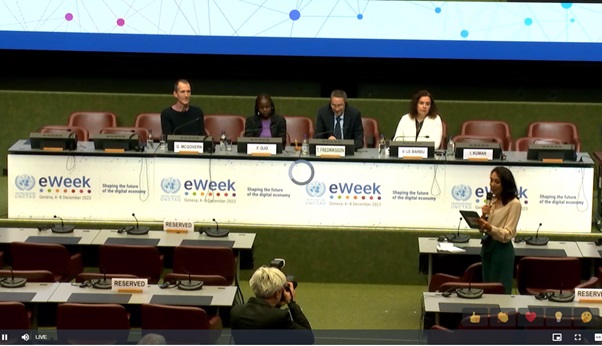
On the panel were: Zheng Shanjie, Chairman, National Development and Reform Commission (NDRC), China; Isabelle Kumar, Former News Anchor at Euro News; Gerry McGovern, Developer of the Top Tasks research method and Author of World-Wide Waste at Customer Care; Foluso Ojo, Founder at TruQ; Marcos Galperin, CEO at Mercado Libre Pedro; Manuel Moreno, Deputy Secretary-General at UNCTAD; Laura Létourneau, Expert Advisor, Ecological and Digital Transformations at Office of the Prime Minister, France; and Melanie Nakagawa, Corporate Vice President, Chief Sustainability Officer at Microsoft.
(Reporting by Pracheta Acharya)
High-level Ministerial Roundtable on Digital Trade
Do Regional Trade Agreements Indicate the Way Forward for the Multilateral Trading System?
The 13th World Trade Organisation (WTO) Ministerial Conference (MC13), scheduled in Abu Dhabi in February 2024, is fast approaching. The countries are working to ensure the conference delivers outcomes that will contribute to the objectives pursued by the multilateral trading system (MTS), including development objectives. Among the topics for negotiation is to ensure that the MTS remains relevant given the digitalisation of trade.
As countries, both developed and developing, are progressing faster in developing rules for e-commerce/digital trade in the context of regional integration arrangements, this session focussed on lessons that can be learned from these developments for the WTO Work Programme on Electronic Commerce as well as the Joint Statement Initiative (JSI) negotiations on E-commerce. Panel members were invited to share their views on how regional blocs can remain stepping stones for multilateralism rather than competing blocs which limit the impacts of digital trade as a means for global integration.
The New Asian regionalisation refers to the increasing economic and digital integration among Asian countries. This trend has had a positive impact on Cambodia’s economy, with the country benefiting from this regionalisation. In the aspect of e-commerce, the Asian e-commerce agreement plays a crucial role in Cambodia’s digital strategy. The agreement facilitates cross-border e-commerce transactions, enhancing consumer confidence and promoting digital inclusivity. Cambodia recognises the potential of e-commerce development and understands the importance of creating favourable conditions for its growth. Regional and sub-regional cooperation can facilitate e-commerce development by creating larger and more integrated markets. This cooperation entails harmonising standards and regulations, sharing knowledge, and pooling resources.
Additionally, Trinidad and Tobago has developed a national single electronic window called TTBizLink that has been operational since 2009. This platform streamlines trade processes and facilitates the issuance of electronic certificates of origin, simplifying and digitising trade procedures. Trinidad and Tobago recently finalised a technical assistance agreement with UNCTAD for the development of a national e-commerce strategy that will serve as a roadmap for maximising the benefits of online trade for local businesses. Furthermore, Trinidad and Tobago focuses on connecting and making digital economies interoperable. They have enhanced their existing e-services to include online payments, resulting in time and cost savings for stakeholders.
The rise of digital trade and cross-border data flows has transformed supply chains, making them more intangible. The integration of digital technologies in trade has facilitated faster and more efficient transactions, as well as increased global connectivity. Furthermore, the significance of service-intensive trade in maintaining overall trade growth. While the trade of goods may experience slower growth, service-intensive trade continues to thrive. This highlights the shift towards a service-oriented economy and the importance of investing in services to drive economic growth. In the last two decades, regional trade agreements (RTAs) have increased from 75 in the year 2020 to over 325. This growth has primarily occurred in the past five years, indicating a significant shift towards regional economic integration. RTAs are particularly crucial for developing nations and the global trade system as a whole. Developing and least-developed countries tend to participate less in RTA negotiations, highlighting the need to ensure their inclusion and representation.
Additionally, the current delicate situation of the WTO’s appellate body could result in ambiguity in the emerging multilateral trade system. In this context, the emergence of regional trading networks can contribute towards sustainable development and the transition to clean and renewable energy sources. Closing the digital divide and ensuring equitable participation is vital for creating a fair and inclusive global trade system.
The session highlighted that over 3.65 billion people globally still do not have access to a computer, indicating a significant gap in digital technology access. Statistics reveal that half of the global population has never seen a computer, underscoring the stark disparity in technological exposure.
As pointed out by HE Puentes, the majority of electronic sales, accounting for 82.3 per cent of the global market, are concentrated in developed countries. This concentration suggests that developing countries face significant challenges in accessing and benefiting from the global electronic market. The unequal distribution of electronic sales exacerbates the digital divide and further widens the economic disparity between developed and developing states.
Furthermore, only 17.7 percent of global e-commerce activity originates from developing countries. Notably, Brazil, India, China, Turkey, and Russia account for three-quarters of this activity. This statistic highlights the limited participation of many developing countries in the digital economy and raises concerns about their ability to compete and thrive in the global market. He also emphasised that only addressing the digital gap is not sufficient, addressing disinformation, misinformation, and the environmental impact of the digital economy is also important.
Data governance has become a crucial aspect of trade agreements, with issues like cross-border data flows and data localisation being addressed. Currently, 49 agreements include rules on data flows, signalling the growing recognition of the importance of data and the need for regulations. Additionally, by leveraging regional stability and growth, countries can participate in multilateral and plurilateral initiatives, fostering stronger foundations for future trade cooperation.
The Global E-commerce Initiative (GSI) negotiations have made significant progress over five years. With the participation of over 90 WTO members, the initiative was launched in 2019 to promote trust, openness, and trade facilitation in the e-commerce sector. To date, these negotiations have resulted in the stabilisation of 13 articles that address various issues related to e-commerce. One of the key challenges faced in these negotiations is the complexity of data-related disciplines.
One of the critical points highlighted in this session is the collaboration between academia and the private sector to identify emerging trends, develop innovative solutions, and provide evidence-based recommendations for digital transformation efforts.
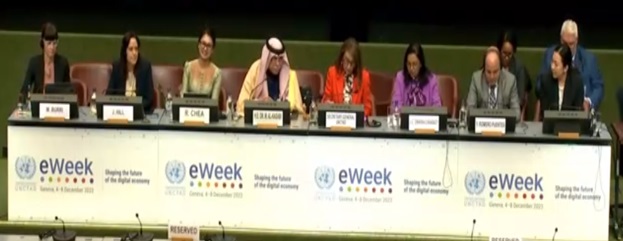
On the panel were: Rebeca Grynspan, Secretary-General, UNCTAD; H.E. Dr Majid Al-Kasabi, Minister, Ministry of Commerce, Saudi Arabia; H.E. Paula Gopee-Scoon, Minister, Ministry of Trade and Industry, Trinidad and Tobago; H.E. Ratha Chea, Secretary of State, Ministry of Commerce, Cambodia; H.E. Yusnier Romero Puentes, Deputy Permanent Representative of Cuba to the United Nations, Chair of the Group of 77, Permanent Mission of Cuba to the United Nations; Johanna Hill, Deputy Director-General, WTO; Mira Burri, Professor of International Economic and Internet Law, University of Lucerne; and H.E. Usha Chandnee Dwarka-Canabady, Ambassador & Permanent Representative, Permanent Mission of Mauritius to the United Nations in Geneva.
(Reporting by Deepmala Ghosh)
Building Fair Markets in the Algorithm Age
This session was organised by eTrade for All, CUTS International and The Dialogue. Panellists discussed how algorithms have affected regulatory efficiency. They noted that COVID-19 increased the flow of goods across market boundaries through the digital platform. The challenges posed by algorithms in regulating the digital market were discussed. One of these challenges is the variation between countries, with some having more advanced markets than others. This has posed certain problems in regions, such as the Common Market for Eastern and Southern Africa (COMESA).
Panellists also noted that digital markets have made it easier for companies to coordinate their marketing activities. The issue of anti-competitive practices was also raised during the discussion. In particular, the difficulty of controlling and regulating certain players. The very identification of anti-competitive actions was also cited as being difficult.
Panellists noted the simultaneous occurrence of innovation and disruption due to algorithms and AI, identifying underserved market anomalies leading to digital divide and monopolistic tendencies. They emphasised the complexity introduced by algorithms and AI and the challenge of responding to, regulating, and enforcing policies, particularly when companies lack a physical presence in certain regions or countries.
Despite these challenges, the panellists advocated for a balanced approach, acknowledging that regulation should not hinder innovation. They stressed the importance of prioritising and aligning benefits regionally. The panellists recognised the positive impact of the digital marketplace on competition, providing consumers with more choices, convenience and better prices. They underscored the necessity of developing digital capabilities through training, regulation, and collaboration with other competition authorities to fully realise these benefits.
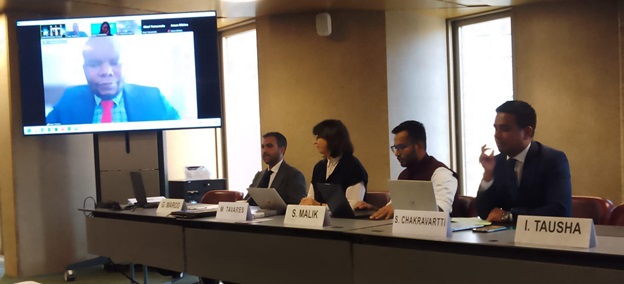
On the panel were: Suddha Chakravartti, Director, CUTS International, Geneva; Akari Yamamoto, Legal Officer at United Nations Conference on Trade and Development; Mariana Tavares, Senior Counsel at Cruz Vilaca Advogados; Gian Marco Solas, Leading Expert at BRICS Competition Law & Policy Centre; Isaac Tausha, Chief Economist, Research Policy & Advocacy Unit at COMESA Competition Commission; and Saksham Malik, Senior Programme Manager – Competition Law and Policy, The Dialogue.
(Reporting by Peter Maundu)
Bees & Honey
How a Small Business and a Tiny Island are Using Digital Technologies and Trade to Save the World’s Bees
This session was organised by the Global Innovation Forum, Standards and Trade Development Facility (STDF) and Niue Honey. Speakers noted that the honey bee population is declining due to climate change, disease and other factors. Bees are under serious threat worldwide. This situation has created problems in terms of livelihoods and the protection of biodiversity, necessitating the creation of bee sanctuaries. They noted that the agricultural sector and food security in general can be addressed through the protection of bees.
In their view, this can be achieved through digital technology, as shown by the case of Niue Honey, which has generated income through the export of honey. They noted that the establishment of a sanctuary policy would allow organisations to intervene as part of a public-private partnership. Ethical retailing is increasingly in demand worldwide, as many consumers are demanding products that are authentic, transparent and have an impact on society. They are, therefore, prepared to pay more for ethical products. Saving the planet through sustainability by telling stories and showcasing them was cited as a good idea for deploying technology to support beekeeping. Ethical honey has proved exclusive because of its high quality, giving people access to a high-value market.
Panellists identified several ways in which technology could be used in beekeeping, such as hive monitoring to improve productivity and reduce costs. Niue Honey has used social media like many MSMEs for marketing, as they do not have big budgets for advertising and branding. Other technological applications in beekeeping were identified during the discussion: quality control, back-office management and accounting.
However, the panellists identified farming practices such as the use of pesticides and the failure to create sustainable businesses around bees as major threats to the existence of bees. They noted that protecting livelihoods would encourage people to put pressure on the government to help create the changes needed to protect bees.
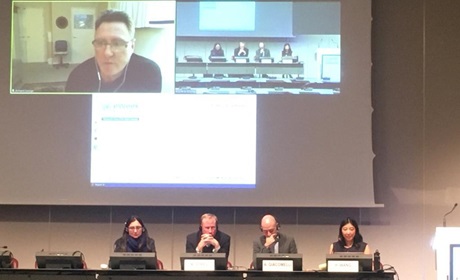
On the panel were: Andrea Giacomelli, Trade Policy and Aid for Trade Advisor at Pacific Islands Forum; Hua Wang, Executive Director at Global Innovation Forum; Melvin Spreij, Head, STDF at WTO; Richard Duncan, President at Niue Honey; and Rupa Chanda, Director at Economic and Social Commission for Asia and the Pacific.
(Reporting by Peter Maundu)
Women Fight Back
Combatting Technology-Facilitated Gender-Based Violence
The session was organised by the Jinishian Memorial Foundation (JMF) and the Centre for International Private Enterprise (CIPE). Increased access and use of digital technologies have fostered women’s economic empowerment while also exposing women to new technology-facilitated harms. Consequences of online abuse include decreased productivity, loss of employment and market access, and self-censure.
This session showcases how businesswomen in Armenia, Colombia, Georgia, and the Philippines are fighting back through digital skills building and security training, and offers strategies for greater knowledge sharing and collective advocacy across borders, sectors, and identities.
Further discussions on how the expanded availability and utilisation of digital technologies have contributed to the economic empowerment of women have also made them susceptible to new harms facilitated by technology. The repercussions of online abuse encompass reduced productivity, job loss, diminished market access, and self-imposed censorship.
Cases, where the companies did not have a mechanism to report cases of online harassment or other forms of harassment because of which women suffer psychological harm or low self-esteem and confidence, were discussed. Further, achieving digital inclusion is contingent upon ensuring digital safety. The benefits of digital products cannot be fully realised without guaranteeing the safety and security of users. The widespread use of the internet and digital products presents a significant opportunity to establish, develop, and regulate a more equitable future for women and girls.
The session also deliberated upon how digital life offers crucial spaces for women to express themselves and pursue opportunities, including access to basic education and services, it also serves as a channel for perpetrators and abusers (individuals, groups, and collectives) targeting women and adolescent girls based on their gender. Technology-facilitated gender-based violence encompasses a range of behaviours such as stalking, bullying, sexual harassment, defamation, hate speech, and exploitation, and is linked to misinformation, disinformation, and violent extremism, all of which occur online or through the use of technology.
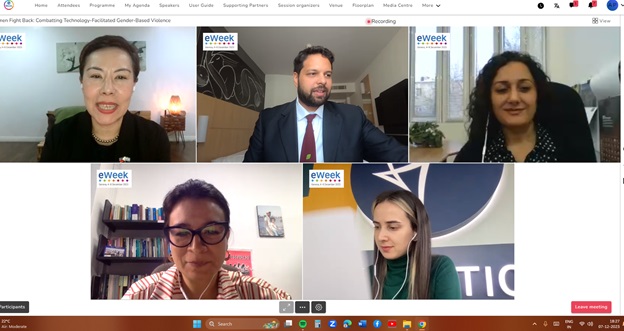
On the panel were: Adam Sachs, Programme Officer, Global Programmes at Centre for International Private Enterprise (CIPE); Liana Sargsyan, Economic Development Programme Coordinator/Deputy Director at Jinishian Memorial Foundation; Gina Romero, Founder and Head of Special Projects at Connected Women, Philippines; Nino Gvazava, Managing Partner at High Tech Solutions Company, Georgia; and Lina Buchely, Director at Observatorio para la Equidad de las Mujeres, Icesi University, Colombia.
(Reporting by Arima Pankaj)
